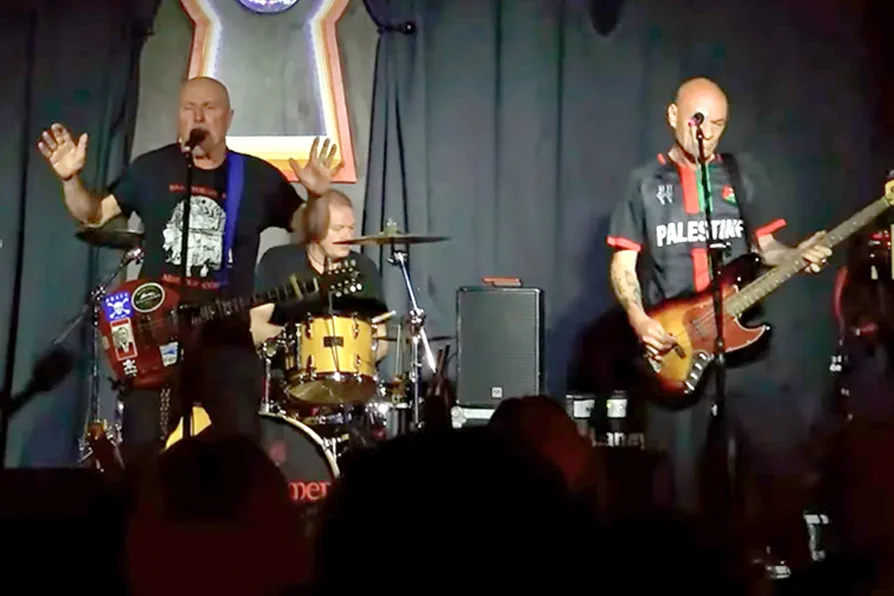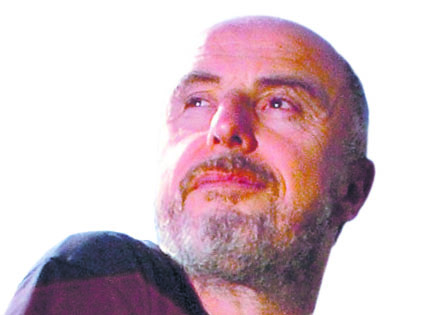TONY BURKE speaks to Gambian kora player SUNTOU SUSSO
The Bard takes issue with a BBC portrait of The Balkans, and sets the record straight

 Attila the Stockbroker and Barnstormer 1649 perform Sarajevo at Hallamshire Hotel, Sheffield, April 2025
Attila the Stockbroker and Barnstormer 1649 perform Sarajevo at Hallamshire Hotel, Sheffield, April 2025
I watch very little TV: I’m too busy writing, performing and socialising. But I did take a look at the first part of The Balkans: Europe’s Forgotten Frontier and can confirm — Reform voters and other fans of abolition, take note — that the BBC is most definitely not biased to the left.
The incredible multiethnic achievement which was postwar Yugoslavia literally ignored in the narrative, its visionary leader Josip Broz Tito dismissed in three words (guess them!), and the ghastly genocide which followed the Western-backed break-up of the federation portrayed as something inevitable.
It was not inevitable. It was planned by the same kind of forces which are now tearing the whole of Europe apart: greedy, divisive, racist, corrupt men (almost always men: women give birth in pain and love and are therefore less inclined to see their own flesh torn apart in front of their eyes as “Dulce et decorum est pro patria mori”). Men financed by other, richer men sharing the same poisonous ideas about race and nation, seeking a joint vision of further personal enrichment coupled with racist cleansing of “the other.”
A curse on them all.
The most poignant moment for me in last night’s programme was when Katya Adler was reporting on a school in Bosnia where the pupils from two of the different ethnic groups were being educated separately under the same roof, but allowed to mix in the playground. The pupils were saying how sad they were that they were not being educated together, and the headteacher agreed. “It’s so sad,” she said. “Especially since this used to be called ‘The School Of Brotherhood And Unity’.”
If the reporter had asked the question, she would have been able to tell the viewers that was its name when all the different nationalities were united as Yugoslavia, and that Brotherhood and Unity was its slogan. (Not “brotherhood” in a gender-specific sense but in a unifying sense, of course.)
She would have found countless ordinary people in all the areas which were once Yugoslavia proclaiming Tito as a hero, a visionary, someone who had managed to construct a functioning, multiethnic society from a postwar genocidal charnelhouse feeding on ancient divisions and racisms.
She could have drawn conclusions about how this was done, how for the vast majority in any society to live in peace and harmony a small minority of selfish, greedy, violent, racist men have to have their freedom taken away as bank robbers and murderers do.
And how this doesn’t just apply to Yugoslavia, but to all human societies, everywhere.
But she didn’t, so I will, in my favourite of all the songs I have ever written, penned in admiration, solidarity, sorrow and anger after hearing about Yugoslavia’s finest export, Laibach’s concerts in Sarajevo under siege in 1994-95.
It is no coincidence that Laibach’s recent concert at Islington Town Hall, a brilliant, dark, passionate warning about the fate which awaits us if we do not defeat the monster before it grows, is the finest live performance I have ever seen.
SARAJEVO
You don’t have to sit back and watch psychopaths fight
The hand of friendship is usually right
Most people want peace and a home somewhere
They don’t care about the thugs and their murderous stare
Now we knew this, and for forty years
a brand new way replaced traditional fears
Most people lived happily side by side
No place for terror, no need to hide
But it wasn’t to the liking of the World Bank suits
Who cheered when the tribes rediscovered their roots
They can handle torture, rape and death
If it opens up markets for the IMF
“Free” now, oh they’re “free” now -
“A chance for individuals to compete”
“Free” now, oh they’re “free” now —
Fascists gun down children in the street.
I remember the messages from Amnesty
Said the whole damn lot of them should be “free”
No matter what they say, no matter what they do
’Cos “they’re all entitled to their point of view”
The liberals cheered when the deed was done
Now they cry in the face of the tank and the gun
And the arms manufacturers are having fun as well
Growing fat on the profits of sectarian hell
Now Tito saw it another way
For a hundred years, educate each day
And suppress the thugs and their murderous lie
Keep the lid on the pot till the hate boiled dry
But they’re “free” now, oh they’re “free” now —
The rape camp guards can have a Big Mac for tea
“Free” now, oh they’re “free” now —
Welcome to Western liberal democracy.
There’s “freedom” in Bischofferode, in East Germany
A town closed due to “economic unviability”
The word has become meaningless, a travesty
For there can be no freedom without power for the free —
and that means more than shopping, actually.
In Afghanistan in 1979
Everybody swallowed the CNN line
Misogynists from the 12th century
Were “freedom fighters” on TV
Kabul was intact, there was peace in the air
A new way of life was being built there
Then the terrorists attacked in Allah’s name
Though they were playing the World Bank’s game
Taliban stooges for American cash
Crushed millions under veil and lash
And when they bit the hand that fed
Bin Laden escaped and the innocents bled
They’re “FREE” now! Oh, they’re “FREE” now!
They freeze in Moscow, burn in Chechnya
“FREE” now! Oh, they’re “FREE” now!
Fascism. War. Poverty. Mafia!
“FREE” now! Oh, they’re “FREE” now!
Look “freedom” up in a Western dictionary
“FREE” now! Oh, they’re “FREE” now!
It says: an IMF loan and a monetarist economy.
In East Berlin the satirists sing:
“Auf die Dauer hilft nur Mauer”
We want our Wall back
We want our Wall back
Can we have our Wall back please?
It may be that future episodes of this BBC series will delve deeper into the history of Yugoslavia and answer some of my criticisms. But the first programme was the very opposite of a good start.











